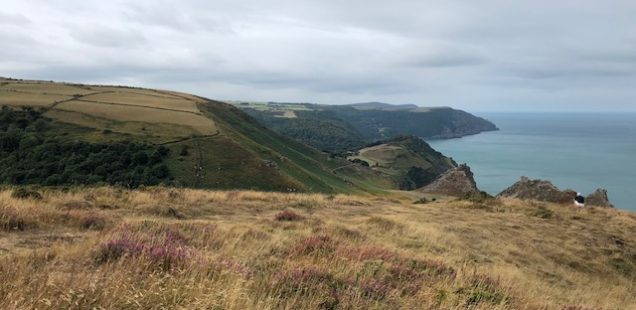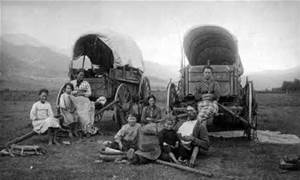
Devon is Dry
The rains came after a week of heat. Finally. Thank God.
Prior to their arrival it was baking and Devon, along with several other English counties had officially been declared in drought. This designation would allow the affected municipalities to “take measures,” specifically and most significantly, to institute hose-pipe bans. Hose pipe bans are of course nothing new in many parts of the USA, I think specifically of California, but in England they are unusual and particularly wounding to a country as fanatically devoted to their gardens as the English are. To walk down the short street of Edwardian homes where we stayed in Lynton, or indeed to walk down any street in Lynton or any other Devonian or English village, is to be overwhelmed by a profusion of blooms bursting forth from window boxes and containers, dripping over stone walls and garden gates and trailing up the sides of houses.
Every time I emerged from the front door of our house, Pip’s Corner, I would stop to smell the roses that were espaliered to the garden fence. Walking down the street, the scent of lavender would take over, a neighbor’s luxuriant hedge swaying under the weight of feasting bees. Turning into the heart of the village, we would pass plot after plot of lovingly-tended plantings. Lynton’s gardens were lush and bursting with color. The hills surrounding Lynton were quilts of dun-colored grass fringed with trees whose leaves were turning yellow too early.
Below Lynton lay the town of Lynmouth. They were connected by a one-hundred-and-thirty-year-old cliff railway and a warren of steep heart-racing paths. The twin towns have been a vacation destination since the late eighteenth century when the Napoleonic Wars made summering on the Continent impossible. “Little Switzerland,” as this area is called, offers stunning views of the sea and the chalk cliffs of Wales on the other side of the Bristol Channel. Its gorges cascade with waterfalls. It’s pebbled beaches are full of sun-bathers and swimmers. The popularity of this area, I read somewhere, peaked in the Victorian era when a string of elaborate cliff hotels were built, most of which are now B & B’s. Yet, if Lynton’s peak has passed, it was hard to see it. The streets were full of families and hikers. The restaurants were fully booked. The tearooms were chock-a-block with folks eating pasties, scones and the local Devonshire ice cream.
A large percentage of them accompanied by their dogs.
If Devon is a paradise for cliff and gorge walkers, it is indisputably a paradise for their hounds. Fuzzy or sleek, grizzled or young, there were woofers everywhere: on the streets, under the restaurant tables, walking the cliff paths, tails wagging and tongues hanging loose. As you might imagine in England, they were all extremely well-behaved. Leashed, they trotted along next to their owners, sat on picnic table cushions with their families and drank their fill from the water dishes that were out in front of nearly every establishment in the town. It was a rare shop that said you couldn’t bring your dog in and a rare B & B that prohibited them from staying. They rode the cliff railway for ₤1 and it wasn’t unusual to feel, as you stood pressed amongst the other passengers, the touch of a cold nose in your palm and a friendly ear begging for a tug.
Behind all this glorious holiday-making, however, a darker local history lurks. A few days before we left, the lower town of Lynmouth celebrated the grim anniversary of an event that continues to haunt the British nation. On the night of August 15th into the 16th in 1952, after two straight weeks of relentless rain on the moors above, these peaty hills took a further nine inches in just five hours, precipitating the disaster for which Lynmouth is most known.
If the water had just risen steadily, more people might have been saved, but the rivers and streams above the town, swelled by boulders and trees, backed up behind bridges and when these obstacles gave way, deadly surges of water and debris roared down the narrow valleys and ripped whole houses from their foundations.
Survival that night depended on several things. It depended on whether you decided to leave your house or to go to bed and hope that the lashing rain would be over in the morning. It depended on whether you were standing in the front room of your house when the surge came through or in the back. It depended on whether you had the strength to crawl out over the ladder that was inserted horizontally into your upstairs window, though strength often did not help you. In the darkness, the power of the water swept both the frail and the strong away.
This deluge from above was so ferocious that the course of the river Lyn was forever changed. The huge riverside walls in the center of the town crumbled. Empty cars with their lights on tumbled past terrified inhabitants as these cars were swept out to sea. Thirty-four people died that night and the town was left a ruin. There was a memorial service when we were there. A wreath of remembrance was laid. People gave speeches.
The Lynmouth Flood wasn’t a climate-change induced disaster, but the architecture of humankind made it worse than it might have been. The bridges that held back the boulders and river trees intensified the surges. Lynmouth’s river walls funneled the waters higher and faster.
In this summer of flood and fire and extreme heat, it’s hard not to regard the Lynmouth Flood as a portent, not of what may happen in the future, but of what we are experiencing right now. The insignificance of humans against the mightiness of nature. What happens when you build heedlessly, ignoring the elements upon which you depend.
The rains which finally came to Devon in the last week of our stay were nothing like the rains of August 1952. As I began writing this, they pattered pleasantly on the conservatory roof and freshened the wind coming in from the sea. They were forecast to continue for several days and we departed Devon through mist-filled valleys and over rainswept hills. Perhaps enough precipitation fell to turn the brown fields green again.
The fields are not green here.
Along with the drought both in Devon and in Connecticut, I feel a nervousness in the air, a pervasive unease that never quite lifts. They are here, all those climate-change-induced weather changes we were warned about. The ones many of us didn’t quite believe, or didn’t believe we would personally experience. They are impacting us, killing us, destroying places and pleasures we hold dear.
Can we wiggle out of it? Humans are great believers in that daring last minute escape. If we are going to do that, however, I think we probably need to do more than wiggle. We need to start running to try to outdistance the most egregious effects of climate change. Sadly, many of the effects are running way ahead of us.





Super writing Linda! I particularly enjoyed this since I know Devon well and can picture the town you stayed in with its abundance of lush gardens and window boxes. My sister’s garden in Norfolk has khaki colored lawns— the drought there is worse than in the west of England. Very big climate issues raised in your piece. Good to have your reminder that we should all be aware of them.
What a great description of natural beauty versus natural distaster. Or rather unnatural distaster. Let’s pray that it’s not too late.